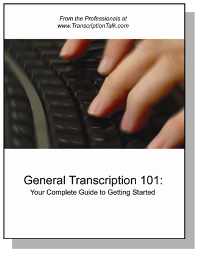There are several sites online that provide general information on writing a professional résumé. This site offers an outline of things to include in your résumé with more detailed information on subsequent pages.
To tailor your résumé to the transcription industry your objective needs to clearly state your intent. This will avoid confusion when responding to ads and ensure that the person being contacted is on the same page as you. Words such as telecommuting and independent contractor help to clear the air of any such confusion.
I list my education because it shows I have a knowledge base to draw from. While it may not relate directly to the transcription industry or be a degree in English or small business management, my education does have relevance and importance in my everyday work. For example, one of my degrees is in Spanish, and I thoroughly enjoy the challenge that accents in a file bring to this job. Having that listed on my résumé reflects that strength and may give me an edge above other people in certain circumstances.
For prior work experience I list the dates of employment, my position title, the company I worked for, and I follow that with short bullet points. My prior work experience did not involve much that relates to transcription, but it was in a medical-related field, and it does show a little bit of what I am interested in as well. I keep my bullet points to a maximum of three per job, and I have only two places of employment listed beyond my current work as a transcriptionist. Those bullet points that I do include deal mostly with the data entry and computer skills associated with those positions. The fact that I worked in a restaurant for five years through high school and the beginning portion of college isn't necessary to include here and is left off my résumé completely.
My résumé also includes a qualifications section where I list computer programs I am familiar with. Some of these include Express Scribe, Start-Stop PowerPlay and Universal, Microsoft Office Suite and other transcription programs. In this section I also list my typing speed; however, I did not when I first started because it was nothing to brag about. It is only now that I find my typing speed to be on par that I include it.
Lastly, I do not have a list of references available on my résumé. I do state at the end that they are available upon request, and I have a list that I keep for myself should I ever need to provide someone with them. These are people previously contacted who have agreed to function in that particular role.
I hope this gives you a place to start honing your résumé towards the transcription industry or brush up one you may already have. A résumé is your first appearance to that potential contract, and having one that is easy to read and quickly focuses on your strengths in this field is important. Look for a later post to cover the bases of effective cover letter writing, even if that cover letter is the body of your email.










































0 Comments:
Post a Comment